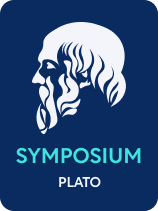

This article is an excerpt from the Shortform book guide to "Symposium" by Plato. Shortform has the world's best summaries and analyses of books you should be reading.
Like this article? Sign up for a free trial here .
What is love, according to Plato’s Symposium? How does each of the Symposium speakers define love?
Plato’s Symposium is a fourth-hand account of a philosophical dialogue that takes place between characters from fourth century BCE Athens at a party. Each character gives a speech, attempting to answer the question “What is love?”
Let’s examine the main arguments of each speech regarding the nature of love.
What Is Love?
What is love, according to Plato’s Symposium? Plato’s Symposium tells the story of a group of Athenian men at a party all giving speeches in praise of love. Their speeches and discussions quickly lead them to try and answer the question, “What is love?” Plato explores this question through the different characters in attendance, and in the process explains the connection between love and philosophy
The first four speeches of the dialogue focus on how love can benefit a person. These speeches fit into two categories:
- Love as virtue: Phaedrus, Pausanias, and Eryximachus begin by discussing what kind of love makes a person virtuous—in other words, what is the best and most moral way to love.
- Love as completion: Then, Aristophanes speaks on how love “completes” a person’s life.
Love as Virtue
Phaedrus gives the first speech connecting love and virtue, while Pausanias and Eryximachus further develop this argument afterward.
Phaedrus’s Speech
In his speech, Phaedrus argues that all love is beneficial and praiseworthy because it makes people more virtuous. Everyone wants the people they love to view them highly, so when a person is in love they’ll be more driven to do good deeds and more ashamed of their bad deeds.
Pausanias’s Speech
Pausanias disagrees with Phaedrus’s argument that all love is praiseworthy, claiming instead that some love is virtuous and some is not. Pausanias explains that virtuous love focuses on intelligence rather than physicality. People who love only for physical pleasure don’t distinguish between good and bad deeds in service of that pleasure—and therefore are not virtuous. He believes that the most virtuous love is a long, committed relationship between two men: Men are more intelligent and a long relationship allows a lover to better develop the intelligence of their beloved.
| Pederasty, the Lover, and the Beloved Understanding the types of relationships discussed in Pausanias’s speech (as well as the rest of the Symposium) requires some cultural knowledge of relationships in ancient Athens. Specifically, it requires further understanding of pederasty: a relationship between an adult man and an adolescent boy that combines mentorship with homosexual sex. A pederastic relationship consisted of an erastes and an eromenos—typically translated to “lover” and “beloved,” respectively. A lover was an older, more respected man. The lover acted as an intellectual and political mentor and also as the penetrator during sex—a role strongly associated with strength and masculinity in ancient Greece. A lover was also the one to pursue the relationship, courting a beloved. The beloved was an adolescent boy, typically between the ages of 12 and 18. He would benefit from the teachings and political station of his lover and was penetrated during sex—a role strongly associated with weakness and femininity. An ideal beloved would offer some resistance to the courtship of a lover; if he had sex too quickly or too frequently, people saw him as overindulgent and non-virtuous. Pausanias’s speech discusses pederastic relationships, suggesting that they are more virtuous than heterosexual relationships because they are part of the beloved’s maturation and intellectual development. Other speeches throughout the dialogue also reference pederasty—in our guide, we’ll use “lover” and “beloved” to clarify when the men discuss pederastic relationships. |
Eryximachus’s Speech
Eryximachus mostly agrees with Pausanias on virtuous love but alters his definition slightly. He suggests that virtuous love requires moderation in all loves and desires. Excess and obsession lead people to commit harm or harm their health (in the same way that eating or drinking too much negatively impacts health or judgment), so it follows that moderation leads to good. Eryximachus also suggests that love doesn’t just apply to sex and relationships—after all, people also love arts and activities like sports or music.
| The Structure of Platonic Dialogue These first three speeches (those of Phaedrus, Pausanias, and Eryximachus) show how Plato tends to structure his dialogues. To further explain what this structure is, we can compare the Symposium to a more straightforward Platonic dialogue: the Laches. In the Laches, the characters of Socrates, Laches, and Nicias try to define bravery through the following four steps: 1) Specific examples: Dialogues tend to start with definitions based on specific, real-world examples. Laches: Laches says that bravery means standing your ground in battle and not running away. 2) Revealing flaws: Next, other characters (usually Socrates) find flaws in the initial definition. They show that the specific example doesn’t work universally. Laches: Socrates suggests that sometimes retreating is the right thing to do, and it doesn’t make sense to say that doing the right thing is cowardly. Therefore, the definition is flawed. 3) Revising and abstracting: Then, characters change their initial definition to address its flaws. Through multiple revisions, their definition becomes more and more abstract as they try to make it universally true. Laches: Later in the dialogue, Nicias suggests that bravery is knowing what to fear and hope for, both in and out of wartime. 4) Concluding: Platonic dialogues often end without a satisfactory definition. Depending on the characters in the dialogue, this can either frustrate and discourage them or inspire them to continue philosophizing. Laches: The dialogue ends without the men settling on a definition of bravery, but they agree to continue their education in the future. The speeches of Phaedrus, Pausanias, and Eryximachus follow the first two steps: They discuss concrete examples of the benefits of love and find flaws in each other’s definitions. Throughout the rest of the guide, keep this structure in mind and consider what corresponds to each step. |
Aristophanes and Love as Completion
Following the first three speeches that try to define love as virtuous and beneficial, Aristophanes approaches the subject in a new direction. He tells a wild story proposing that love allows a person to complete themselves: Humans used to be two people in one, fused back to back. However, they became arrogant, and the gods split them in half as a punishment. Now, love and sex are human attempts to return to that previous combined, “whole” state. From this story, Aristophanes draws three main conclusions:
- People have “soulmates.” Aristophanes suggests that everyone still has their other half in the world somewhere, and they are perfect for each other.
- Love is the desire to become whole. What people experience as love is actually just their desire to become whole again. This is why soulmates that find each other will stay together for their entire lives—it’s as close they can get to being whole again.
- Homosexuality (among men in particular) is natural and moral. Aristophanes claims that some of the dual-humans were pairs of two women or two men—and so their love results from the same divine “split” that created heterosexuality. In addition, Aristophanes suggests that homosexual men are more courageous and manly—and therefore more moral—than heterosexual men because they’re attracted to those traits in others as well.
(Shortform note: If you think Aristophanes’s speech feels out of place, then you’re right—and scholars suggest that Plato did that on purpose. For the most part, the men in the Symposium speak from left to right, and each speech develops the ideas of the previous. However, Aristophanes breaks both of these rules—they skip over him until later, and the ideas of his speech mostly exist independently. Scholars suggest that this is Plato saying that Aristophanes (a staunchly conservative comic playwright and strong critic of Socrates) and others like him don’t contribute to the development of wisdom—and even disrupt it.)

———End of Preview———
Like what you just read? Read the rest of the world's best book summary and analysis of Plato's "Symposium" at Shortform .
Here's what you'll find in our full Symposium summary :
- Plato’s philosophies on love, happiness, education, and reproduction
- Agathon’s description of Eros, the god of love
- What it means to love beauty itself






